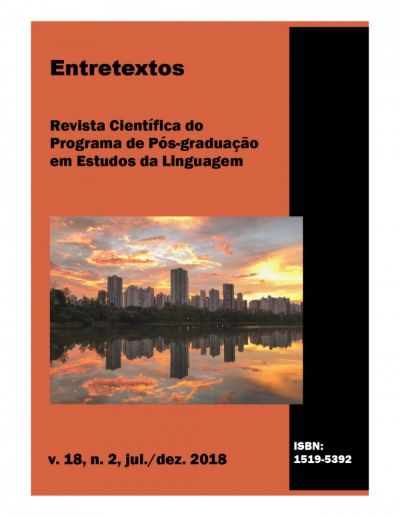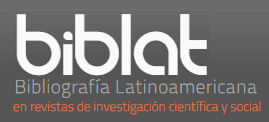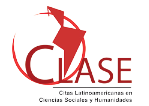Negotiation of intercultural issues in telecollaborative spaces
DOI:
https://doi.org/10.5433/1519-5392.2018v18n2p121Keywords:
Telecollaboration, Intercultural issues, Interculturality, Intercultural competence, Digital tools.Abstract
The use of the Internet in the area of teaching and learning languages is the object of research. However, there have been no studies on the review of investigations that focus on the negotiation of intercultural issues in telecollaborative contexts. Such a finding as well as the relevance of literature reviews helped us to outline the objective of this study, that is, to understand how the negotiation of intercultural issues occured in telecolaborative spaces in four studies: Understanding the ‘Other Side’: Intercultural Learning in a Spanish-English E-mail Exchange (O’DOWD, 2003); The use of videoconferencing and e-mail as mediators of intercultural student ethnography (O’DOWD, 2006); Using e-learning to develop intercultural awareness in ELT: a critical evaluation in a Thai higher education setting (BAKER, 2012a) and, finally; Exploring ‘new’ interculturality online (DERVIN, 2014). Our analysis showed that the contact between different cultures does not guarantee intercultural understanding and that the concept of culture is still based on a national framework.Downloads
References
BAKER, Will. From cultural awareness to intercultural awareness: culture in ELT. ELT Journal, London, v. 66, n. 1, p. 62-70, 2012a.
BAKER, Will. Using e-learning to develop intercultural awareness in ELT: a critical evaluation in a thai higher education setting. London, UK: British Council SW1A 2BN, 2012b.
BYRAM, Michael. Teaching and assessing intercultural communicative competence. Clevedon: Multilíngual Matters, 1997.
BYRAM, Michael; GRIBKOVA, Bella; STARKEY, Hugh. Developing the intercultural dimension in language teaching: a practical introduction for teachers. Strasbourg: Council of Europe Publishing, Language Policy Division, 2002. Disponível em: http://www.coe.int/t/dg4/linguistic/Source/Guide_dimintercult_EN.pdf. Acesso em: 14 maio 2016.
DERVIN, Fred. Exploring ‘new’ interculturality online. Language and Intercultural Communication, Helsinki, v. 4, n. 2, p. 191-206, 2014.
EWING, Katherine. The illusion of wholeness: culture, self, and the experience of inconsistency. Ethos, Washington, v. 18, n. 3, p. 251-278, 1990.
FANTINI, Alvino. Exploring and assessing intercultural competence. Federation EIL: Brattleboro, 2006.
FORNET-BETANCOURT, Raúl. La interculturalidad a prueba. Wissenschaftsverlag Mainz: Aachen, 2006.
KRAMSCH, Claire. Context and culture in language teaching. Oxford: Oxford University Press, 1993. KRAMSCH, Claire. Post 9/11: foreign languages between knowledge and power. Applied Linguistics, Oxford, v. 26, n. 4, p. 545-567, 2005.
LEVY, Michael. Computer-assisted language learning: context and conceptualization. Oxford: Claredon Press-Oxford University Press, 1997.
O’DOWD, Robert. Intercultural communicative competence through telecollaboration. In: JACKSON, Jane. The routledge handbook of language an intercultural communication. New York: Routledge, 2012. p. 342-358.
O’DOWD, Robert. Telecollaboration and CALL. In: THOMAS, Michael; REINDERS, Hayo; WARSCHAUER, Mark (ed.). Contemporary computer-assisted language learning. London: Bloomsbury, 2013.
O’DOWD, Robert. The use of videoconferencing and e-mail as mediators of intercultural student ethnography. In: BELZ, Julie; THORNE, Steven. (ed.). Internet-mediated intercultural foreign language education. Boston, MA: Heinle & Heinle, 2006. p. 86-120.
O’DOWD, Robert. Understanding “the other side”: intercultural learning in a spanish–english e-mail exchange. Language Learning & Technology, Santa Barbara, CA, n. 7, p. 118-144, 2003.
RISAGER, Karen. Language and culture pedagogy: from a national to a transnational paradigm. Buffalo, NY: Multilingual Matters, 2007.
SAMOVAR, Larry; PORTER Richard; MCDANIEL, Edwin. Communication between cultures. Belmont, CA: Thomson, 2004.
SPITZBERG, Brian; CHANGNON, Gabrielle. Conceptualizing intercultural competence. In: DEARDORFF, Darla. The sage handbook of intercultural competence. Los Angeles: Sage Publications, 2009. p. 2-52.
THORNE, Steven. Pedagogical and praxiological lessons from internet-mediated intercultural foreign language education research. In: BELZ, Julie; THORNE, Steven (ed.). Internet-mediated intercultural foreign language education. Boston, MA: Heinle & Heinle, 2006. p. 2-30.
ZIENKOWSKI, Jan; ÖSTMAN, Jan-Ola; VERSCHUEREN, Jef (ed.). Discursive pragmatics. Amsterdam: Benjamins, 2011.
Downloads
Published
How to Cite
Issue
Section
License
Entretextos adota a Licença Creative Commons Attribution 4.0 International, portanto, os direitos autorais relativos aos artigos publicados são do(s) autor (es).
Sob essa licença é possível: Compartilhar - copiar e redistribuir o material em qualquer suporte ou formato. Adaptar - remixar, transformar, e criar a partir do material, atribuindo o devido crédito e prover um link para a licença e indicar se mudanças foram feitas.




















